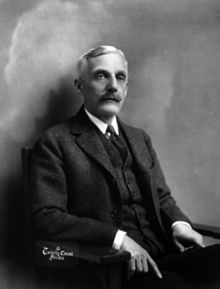Andrew W. Mellon
| Andrew Mellon | |
|---|---|
 |
|
| United States Ambassador to the United Kingdom | |
|
In office April 9, 1932 – March 17, 1933 |
|
| Monarch | George V |
| President |
Herbert Hoover Franklin D. Roosevelt |
| Prime Minister | Ramsay MacDonald |
| Preceded by | Charles G. Dawes |
| Succeeded by | Robert Worth Bingham |
| 49th United States Secretary of the Treasury | |
|
In office March 9, 1921 – February 12, 1932 |
|
| President |
Warren G. Harding Calvin Coolidge Herbert Hoover |
| Preceded by | David F. Houston |
| Succeeded by | Ogden L. Mills |
| Personal details | |
| Born |
Andrew William Mellon March 24, 1855 Pittsburgh, Pennsylvania, U.S. |
| Died | August 26, 1937 (aged 82) Southampton, New York, U.S. |
| Resting place | Trinity Episcopal Church Cemetery Upperville Fauquier County, Virginia |
| Nationality | American |
| Political party | Republican |
| Spouse(s) | Nora McMullen (1878–1973 m. 1900–1912 divorced) |
| Relations | Richard B. Mellon (1858–1933) (brother) |
| Children |
Paul Mellon (1907–1999) Ailsa Mellon Bruce (1901–1969) |
| Parents |
Thomas Alexander Mellon (1813–1908) Sarah Jane Negley (1817–1909) |
| Alma mater | Western University of Pennsylvania (University of Pittsburgh) |
| Profession | Banker, politician |
| Religion | Episcopalian |
Andrew William Mellon (/ˈmɛlən/; March 24, 1855 – August 26, 1937) was an American banker, businessman, industrialist, philanthropist, art collector, United States Ambassador to the United Kingdom and United States Secretary of the Treasury from March 9, 1921 to February 12, 1932, from the wealthy Mellon family of Pennsylvania.
Mellon was born in Pennsylvania on March 24, 1855. His name is listed on the 1860 Census as "William A. Mellon." His father was Thomas Mellon, a banker and judge who was a Scots-Irish immigrant from County Tyrone, Ireland; his mother was Sarah Jane Negley Mellon. He had three older brothers, Thomas A., James R. and Samuel, and he also had a younger brother named Richard B. Mellon. He was educated at the Western University of Pennsylvania (now the University of Pittsburgh) and left before graduating.
Mellon demonstrated financial ability early. In 1872 his father set him up in a lumber and coal business, which he soon turned into a profitable enterprise. He joined his father's banking firm, T. Mellon & Sons, in 1880 and two years later had ownership of the bank transferred to him. In 1889, Mellon helped organize the Union Trust Company and Union Savings Bank of Pittsburgh. He also branched into industrial activities: oil, steel, shipbuilding, and construction.
...
Wikipedia
